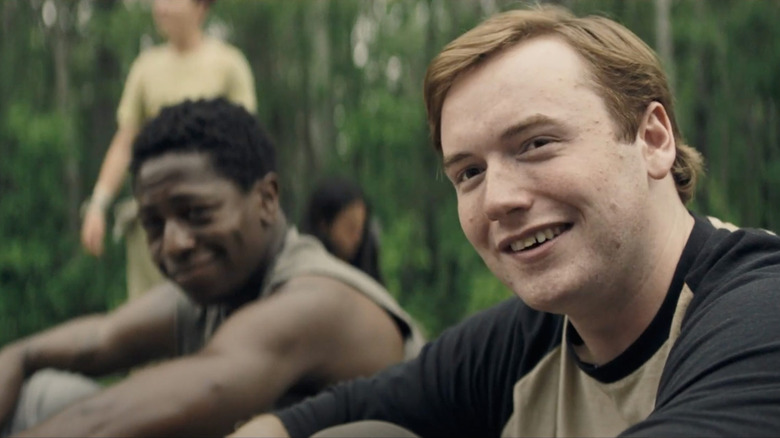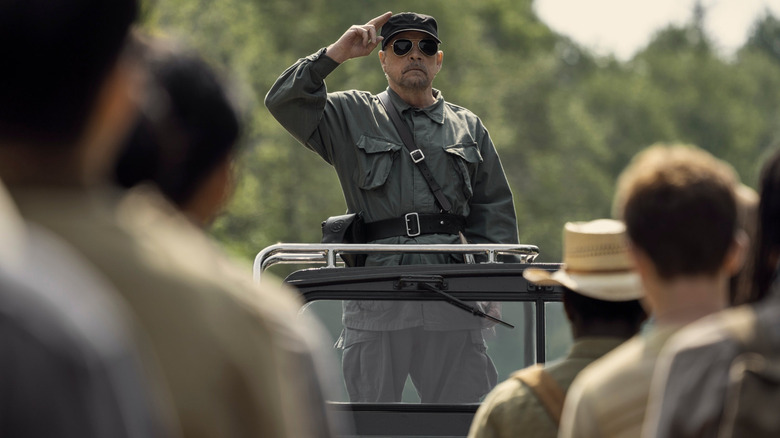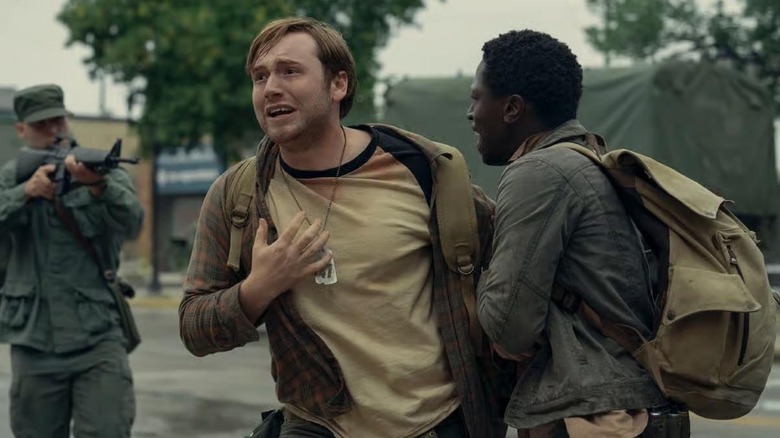One Key Thing Separates The Long Walk From The Hunger Games
WARNING! This article contains minor spoilers for "The Long Walk." Nothing will be discussed that hasn't already been featured in the trailers.
Francis Lawrence — the filmmaker behind "The Hunger Games: Catching Fire," "Mockingjay Parts 1 & 2," "The Ballad of Songbirds and Snakes," and the forthcoming "Sunrise on the Reaping" — has carved out a chilling niche for himself by adapting dystopian novels where children are thrown into blood-soaked arenas and their survival turned into spectacle. Few directors understand the hope that can still be found in the bleak systems that pit youth against one another, where a single survivor stands with a trail of bodies in their wake, and is celebrated as a hero by the audience that demanded the slaughter in the first place. So, when news broke that Lawrence would direct the long-deemed "unfilmable" adaptation of Stephen King's "The Long Walk" (originally published under the pseudonym Richard Bachman), it was an inspired choice. If anyone could capture the methodical, agonizing crawl of state-sanctioned brutality masquerading as entertainment, it's Lawrence.
"The Long Walk" is the blueprint for many of the "oppressed people fight to the death" stories that have become so popular in recent years — not only "The Hunger Games" but also "Battle Royale" and even "Squid Game." Against the backdrop of the Vietnam War, a 19-year-old King began writing a story about an alternate America where boys are forced to walk until their bodies physically can't anymore and are massacred for failing to outlast their comrades. Given the similarities between the annual Hunger Games and the annual Long Walk, for those unfamiliar with King's story it would be easy (albeit foolish) to assume that Lawrence is retreading familiar territory. However, there's a massive difference between these stories that allows each to maintain a wholly unique identity, and I'm not just referring to the MPA rating.
Here's what separates them: "The Hunger Games" features players who are all trying to kill each other; "The Long Walk" features competitors who are trying to keep each other alive for as long as possible.
The Hunger Games and The Long Walk display suffering as spectacle in different ways
In both "The Hunger Games" and the original novel of "The Long Walk," the competitions are broadcast nationwide for the entertainment of the general public. Spectators look forward to the event every year, onlookers bet on the outcome, and folks root for their favorites from the sidelines. Lawrence and screenwriter JT Mollner ("Strange Darling") could have easily showcased the audience for the annual walk, but given the shift in the priorities of the characters, they wisely elected to focus on the interpersonal relationships between the walkers. Some of the most powerful moments throughout the "Hunger Games" franchise are the human bonds forged by those who are thrust into the games: Katniss and Rue, Mags and Finnick, Beetee and Wiress. These are partnerships that exist not out of romantic love, but something else entirely. The lifeblood of "The Long Walk" are these connections distilled into their purest form.
The film's audience knows that all eyes are on the titular walk, but we're not privy to which of their conversations have been broadcast to the outside world. Do the viewers at home see how each of the boys reacts when one of their new friends gets their ticket, or are the cameras too busy focusing on teenagers taking a bullet to the brain? Are audiences cheering whenever Ray Garraty (Cooper Hoffman) is saved by Peter McVries (David Jonsson), or disappointed that he's not leaving him to die? Quite frankly, it doesn't matter. There is no benefit to being a fan favorite the way there is in the Hunger Games, so the opinions of anyone outside of the walk itself do not matter and do not necessitate stealing the little precious runtime these boys are getting on screen in the first place.
Inlike in "The Hunger Games," where those watching are either the propaganda-pilled denizens of the Capitol or the agonized members of the district waiting to see if one of their own has died, we don't need to see what other people think of "The Long Walk," because we are the ones in that role. The walk is a spectator sport, and we are the spectators. If anything, we're actually seeing more of the Walk than the average "fan," because a person can't be tuned in every moment of every day. It's hard not to think about it in relation to our own existence. What is lost when we're only seeing pieces of the full story? Typically, it's humanity, camaraderie, and unity in favor of statistics.
The love story at the center of The Long Walk
America has an odd relationship with love, often exclusively reserving the word for romantic relationships and nothing else. The relationships between the boys on "The Long Walk" are the emotional core of the story, revealing the well of human connection always available in the face of fascism. With each step they take forward toward certain death under an oppressive regime, their quickly forged bonds — friendships, shared memories, and moments of compassion — exist in stark levity to the dehumanizing system that forced them into the situation in the first place. As I described the relationship between Ray and Pete in my review, "Their love, whether platonic, romantic, or something impossible to understand unless under the circumstances of The Walk, is the lifeblood of the entire film. Each conversation between the pair is transfixing, with a quiet desperation in every glance, every step in tandem."
It could be argued that this is the same draw of "The Hunger Games," as observers quickly become attached to Katniss (Jennifer Lawrence) and Peeta (Josh Hutcherson), but Ray and Pete are different. Pete has only known Ray for a short while before he famously tells him, "Just go on dancing with me like this forever, Garraty, and I'll never tire. We'll scrape our shoes on the stars and hang upside down from the moon." Their intimate bond is immediate because they both know they'll only have each other for a few days, and there's no time to waste getting hung up on distractions that don't matter. All that matters are the moments they have left, and how they choose to spend them together.
And the same could be said for every relationship shared by all of the walkers, all engaging in acts of quiet resistance each time they help another walk just a little bit further. As a rated-R drama, "The Long Walk" does not hold back on the graphic depiction of their deaths, validating the real tragedies that so many have become desensitized to, as videos of in-progress genocide are always just a timeline scroll away. When there's no finish line to cross, watching total strangers help each other, even if they know only one of them will make it out alive, becomes a powerful symbol of defiance.
It's not strength, obedience, or "winning" that carries us forward, because life is a battle that cannot be "won." Our ability to feel, connect, and stand together against cruelty is what really matters, even if it's only for a short amount of time.
"The Long Walk" is now playing in theaters everywhere.


